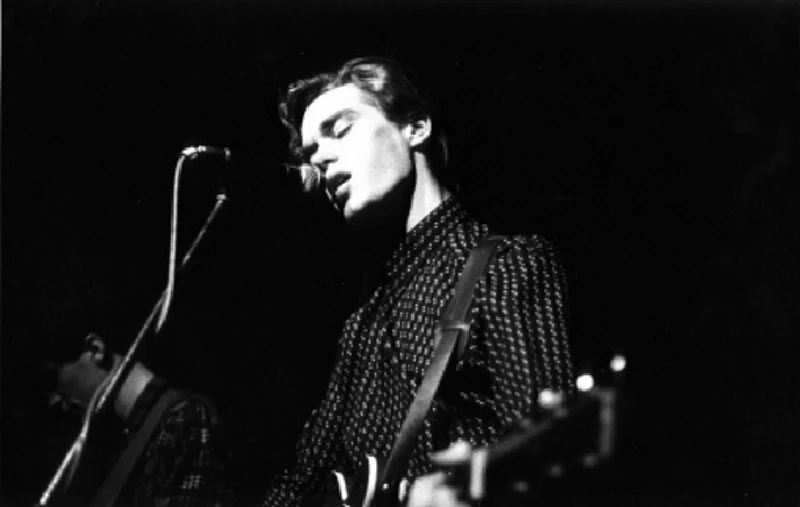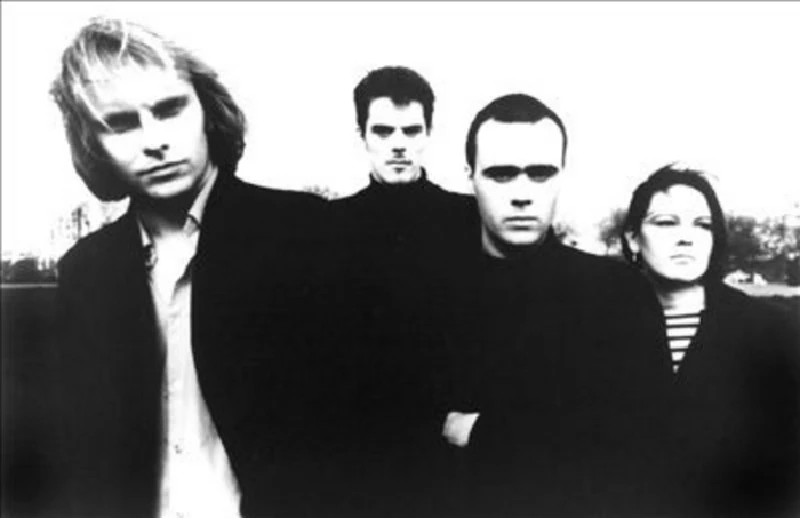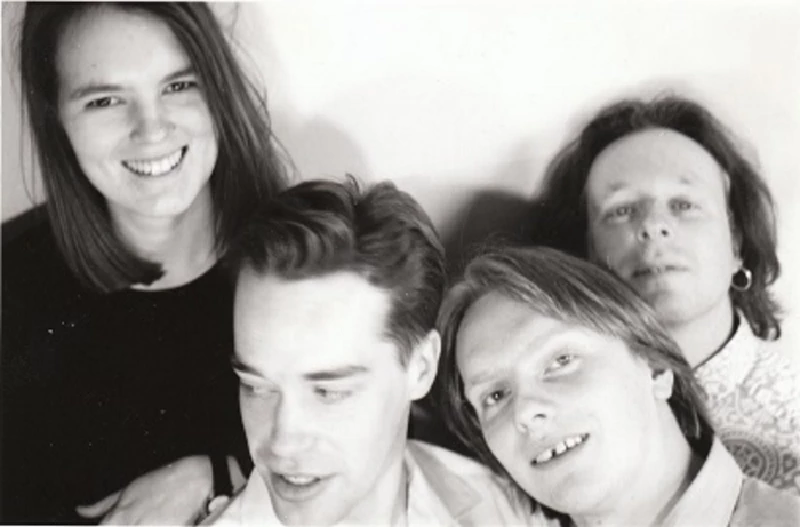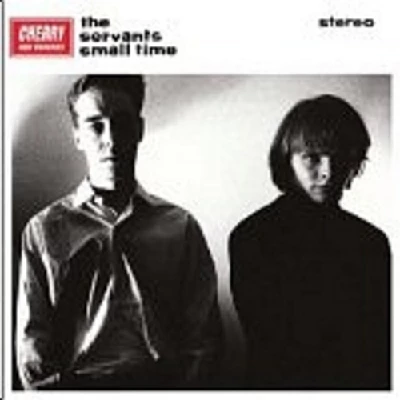Servants - Interview
by Anthony Strutt
published: 6 / 6 / 2014

intro
Anthony Strutt chats to David Westlake from 80's guitar pop band and C86 act the Servants about his band's turbulent career and working in it with the young Luke Haines
The Servants formed in London in 1985 and originally consisted of singer-songwriter David Westlake along with guitarist John Mohan, bassist Phil King and drummer John Wills. This first line-up of the band released both a single 'She's Always Hiding' and an EP 'The Sun, A Small Star' on Head Records in 1986. It also appeared on the 'C86' tape with 'Transparent', the B-side to 'She's Always Hiding', but it split when both King and Wills left, King to join Felt and Wills to become a member of Loop. Westlake signed to Creation Records and in 1987 released an eponymous mini-album upon which the Triffids appeared as his backing band. Like the previous two single and EP, 'Westlake' revealed his to write stylishly-crafted guitar pop tunes but was little heard. After being dropped by Creation, Westlake brought the Servants out of hiatus in a new line-up which consisted of Luke Haines on vocals and guitar, Haines' then girlfriend Alice Readman on bass and Hugh Whitaker on drums. This incarnation of the group finally released an album 'Disinterested' in 1990 on Paperhouse Records, and recorded a follow-up 'Small Time' in 1991 which only finally came out last year. Since the Servants split up in 1991, Haines has gone on to success with the Auteurs, Black Box Recorder and as a solo artist. Westlake's musical output has in contrast been confined to just one recording, an album 'Play Dusty for Me' in 2002. Westlake, who has retrained as a solicitor, recently played his first live show with a backing band in thirteen years, a ten-bill gig to celebrate the release of the 'C86' box set at the 229 Club in London in June. Pennyblackmusic spoke to David Westlake about both the Servants and the C86 album. PB: The Servants were on the original 'C86' album, but chose to release the debut single’s B-side, ‘Transparent’ – a song apparently about masturbation. Why did you choose to do this when the A-side, ‘She’s Always Hiding’, was such a great song? DW: The 'NME 'did ask for ‘She’s Always Hiding’. I was glad to be invited to contribute a track to 'C86', but I was ambivalent about the prospect of being included. Readers were expected initially to send away for a cassette. I think you maybe even have had to save tokens or something. No one expected many people would bother. More broadly, the quality of the music press was in decline by then. The 'NME' and 'Sounds' no longer had the monochrome ‘Printhead’ rigour – the integrity and the thought – which made them essential reading in the late ’70s. Being in competition with the empty but popular 'Smash Hits' made them less intelligent. They became desperate for new trends and gimmicks, and from one week to the next they were cavilling and capricious. Had I known 'C86' would go on to be pressed up for general release by Rough Trade and be remembered as it has, I would have given a better song recorded in the same session, ‘Loggerheads’. Because of my reservations, I gave the B-side. There seemed less potentially to lose. I always hated ‘Transparent’. The Servants played it live only once. I wrote it in my teens, while I was still learning how to put a song together. Before I found my own way. The Syd Barrett influence is obvious. I was already developing as a songwriter by the time ‘Transparent’ was recorded. PB: How important do you think the album was at the time? Did you feel with it that you didn’t want to be placed in a bag with what were then a lot of indie hopefuls, who mostly got a major deal but then didn’t produce the goods? DW: No one expected that 'C86' would be remembered in 1987, let alone 2014. I didn’t receive a copy of the original compilation, and I didn’t get around to buying one. I still have not actually heard it in full, so I’m looking forward to the reissue. Bob Stanley had some interesting things to say in the notes to the CD86 edition. If the bands on 'C86' shared anything it was possibly a residual punk ideology. I was conscious of there being a scene centred on a number of disparate bands. But it was a scene characterised by disunity. There are precedents for different people on a scene having a productive contrariety or antipathy to each other, be it artistically or personally. That went to the heart of C86, I think. Beyond that, I didn’t think about other groups. I know embarrassingly little about my contemporaries. It’s no disrespect to them – I was just doing my own thing. I assume they know as little – or less – about me. I had no particular desire for a major deal. I did want to be able to make records, but the way I saw it if someone heard the music and liked it they could search it out if it was available somehow, big deal or small. I hoped more for label people who might be interested in what I was doing, and want to be a part of it or have it be a part of what they might be trying to do, rather than a corporation whose interest would extend only to – and be contingent upon – shifting units to generic consumers. My aim was always just to make good art. PB: How did the band get their name? Was it a reference to the 1960's film 'The Servant'? DW: Yes, I named the band after the film. I saw it before reading Robin Maugham’s novella. BBC2 screened the film quite often in the early 1980s. I was interested in the narrative and what it had to say about the psychology of different types of relationship. As a teenage Velvet Underground aficionado, I felt the name could seem at the same time to have a distant, semiotic, sub-dom echo from the ‘Venus in Furs’ lyric. You know: "Comes in bells, your servant, don’t forsake him." PB: You signed to Head for ‘She’s Always Hiding’, and then followed this up with a 12-inch, ‘The Sun, a Small Star’. These are, for me, great songs. Why wasn’t an album recorded at this early period? DW: Thank you for the kind words. There was more than enough material for an album. But the line-up I had then drifted apart the first time the band got dropped. The label dropped us. It came to be a common thing for bands at the time to make a single or two for a label before getting dropped and moving on. The Servants was obviously a low-key prospect for any musicians I was lucky to have play my songs with me. But I felt that a great band ought to aim at being a circumscribed union. I was 21 – still idealistic. I wanted whoever was in the Servants to do only the Servants, and not play with any number of other bands, fitting the band in around other bands when convenient. The rhythm section on the first two singles was five to eight years older than me, so they were more pragmatic then about the ups and downs of being a musician. Being good players, they had no trouble fitting into other set-ups, both while that line-up was still going and when we got dropped. But I was left out on a limb, not knowing if we would get to make another record. I knew I wanted to keep the Servants going. I liked being in a band, even if the short experience I’d had up to then showed me that the kind of unity I was looking for must be rare. I searched anxiously around for an opportunity to make another Servants record, but the others already had work elsewhere. It’s what can happen when a band doesn’t have long-term friendship as a foundation to see you through uncertain times. I’d started out with that foundation. The first bass player was my friend Ed Moran. We’d known each other since age four, and went to the same schools. It was Ed who brought in John Mohan, who was fantastic on guitar. An engineering apprenticeship took Ed away before we even started playing live, but he kept up with the band when he could, helping out driving. Someone else I knew from school, Eamon, played drums at most of the early shows, but he became unavailable to rehearse or play gigs owing to a police-curfew following his alleged involvement in a public disorder incident, the Neasden Riots. Neasden Riots became his nickname within the band, like the Clash’s Tory Crimes. PB: You next recorded a mini-album under your own name for Creation Records. The Triffids played on it, and you were joined by Luke Haines, who became a major player for the band. How did he and his then girlfriend, Alice, get involved? DW: Luke answered an NME ad I placed after I was left in the lurch in late ’86. I was still looking for a full-time Servants line-up. Luke was the first person with whom it really clicked, both artistically and personally. If I could have found a good and committed rhythm section at the same time I would have made the Creation album a Servants record. But, like you say, Martyn and Alsy of the Triffids were on it. Luke stayed for five years. We were both very particular about what we were looking for in others, and we came to realise how rare that was to find. Try as we did up to ’89/’90, we simply couldn’t find a suitable bass-player by the usual means, so Alice agreed to take up the instrument. She became a bespoke bass-player. PB: In 1990 Glass/Fire-offshoot Paperhouse Records released 'Disinterest', an album that was overlooked at the time. Your second album, 'Small Time', wasn’t released at all. Did you feel that you had given it your all, and was that why you disappeared from the music world? DW: You missed out the third Servants single. We recorded ‘It’s My Turn’ for Glass Records in 1988. It had to wait twelve months to be released. You couldn’t help but like Dave Barker, who owned Glass. And the Glass label, while it remained his. But organisation and drive were not recognisably Dave’s strengths. We ended up with the record company for whom we did 'Disinterest', not directly through choice. The album came out of a set of unspeakable frustrations and miscellaneous perversity. Friends let me know that 'Mojo' magazine included 'Disinterest' in their 2011 list of the greatest British indie records. Which was an honour. Unfortunately, the album was deleted not long after release. It hasn’t been available for more than twenty years and I don’t see it being reissued. The Servants became a duo for 'Small Time'. That was a pleasure to do. We made overtures to the end of getting it released at the time. But, as Luke says elsewhere, we both knew – and suspected the other knew – while we were working on it that it would never come out. Luke told me in 1991 he was leaving. I was quietly upset. In five years, we never exchanged a cross word. But he did everything with complete integrity, and I understood. What we were doing was art, but it became nihilistic and unhealthy. And look what great art he had ready to show the world, so it was natural and right. No, I didn’t feel I had given my all. I just couldn’t find anyone who wanted all I had to give. I felt confident of my art, and the ideas and the inspiration never deserted me, but I was always unskilled at the industry side of things. It went against the grain when I had to approach record companies. I sent out four demos only, when other people would send out batch upon batch and think nothing of it. Much of the time you would be dealing with people whose opinion you had little reason to respect. Equally, from their point of view, they had no reason to respect me if I wasn’t going to sell records. And my track record showed I wasn’t. I needed to get back to why I started doing it in the first place – the art, for myself and friends – and forget and escape the industry side. I subscribed to the W. C. Fields line: if at first you don’t succeed, try again; then give up – no use being a darn fool about it. I saw John Mohan for a drink for the first time in many years after New York label Captured Tracks released the Servants’ 'Youth Club Disco' LP in 2011. We remembered how it was Phil King – bass-player after Ed Moran left – who persuaded us to go public and play live at all in the first place. He gave us an ultimatum: either we play gigs or I’m leaving. Mohan and I would probably have just carried on privately working on the art otherwise. PB: 'Small Time' finally came out twenty-one years after it was recorded on Cherry Red. Are you glad it finally saw the light of day? DW: So glad, yes. It is my favourite Servants record. I didn’t think it would ever see the light of day. The album was like unfinished business, so much work having gone into it, only never to be heard. A lot of time went into transferring and synchronising the tapes. Different parts were on different tapes recorded at minutely varying speeds, so it was a complex job marrying everything together. For more than twenty years Luke and I were the only people who had heard it. Luke gave me the tapes for my fortieth birthday, in 2005. I like the way of thinking expressed in the songs. How ‘Everybody Has A Dream’ answers the complaint "All you get is nowhere," by reasoning "Where is there to get?" And the song ‘Aim In Life’ pretty much sums up how I felt at the time: "You smile at the victory that is your own defeat" and yet "You wouldn’t have it any other way." I like the sound of the album. Like Dragnet, it works as an antidote to over-worked, over-polished recordings. Not only was it that 'Small Time' finally saw the light of day, but it was on a better label – Cherry Red – than it would have been at the time. Captured Tracks issued it on vinyl in 2013, as well. PB: You put out a solo album, 'Play Dusty for Me', in 2002. Would you like to tell us about it, and how you came back to recording music again? DW: Ideas didn’t desert me after the Servants finished in 1991, as I say. I stopped making any attempt where the industry was concerned. But I didn’t stop writing. It was art for art’s sake. I was invited to play a few gigs in the late ’90s, which encouraged me to arrange some of the songs I’d written for performance by a band. I was helped out on 'Play Dusty for Me' by some excellent musicians. My friend Dan Cross, guitar-great from another ’80s band, Perfect Disaster. And Cormac and his brother Willis Moore on bass and drums. I pressed up a short-run at Tenth Planet in London, but for me it’s a pity that it hasn’t ever been properly released in physical form. PB: Other than appearing at the forthcoming C86 show and playing on stage recently with Luke Haines at the Lexington in London, do you have any more plans for making music? DW: The C86 show will be my first gig with a band for thirteen years. I shall be joined by my friend Dan Cross, who played on the 'Play Dusty for Me' album. I’m currently working with friends on a musical screenplay. I’ve completed the lyrics to the music, scored by Des Lambert. Helping out now on the script, which is by Jonny Simon. It’s centred on actor Tom Hardy. A twenty-first century revenge tragedy with tunes. Great songs and narrative, truly. Release-wise, New York label Captured Tracks will be issuing a Servants live album in 2014. There are a couple of otherwise-unrecorded old songs on there. I would like to make another album. PB: Thank you.
Band Links:-
https://www.facebook.com/theservantsofficialhttp://www.lostsheep.com/davidwestlake/
Picture Gallery:-


reviews |
|
Small Time/Hey Hey We're the Manques (2013) |

|
| Fabulous second album from underrated late 80’s and early 90’s indie band the Servants, which has finally been released twenty one years after it was recorded |
most viewed articles
current edition
Carl Ewens - David Bowie 1964 to 1982 On Track: Every Album, Every SongArmory Show - Interview with Richard Jobson
Bathers - Photoscapes 1
Colin Blunstone - Thalia Hall, Chicago, 16/7/2025
Visor Fest - Valencia, Spain, 26/9/2025...27/9/2025
Billie Eilish - O2 Arena, London, 10/7/2025
John McKay - Interview
Robert Forster - Interview
Loft - Interview
the black watch - Interview
previous editions
Heavenly - P.U.N.K. Girl EPManic Street Preachers - (Gig of a Lifetime) Millennium Stadium, Cardiff, December 1999
Oasis - Oasis, Earl's Court, London, 1995
Beautiful South - Ten Songs That Made Me Love...
Trudie Myerscough-Harris - Interview
Paul Clerehugh - Interview
Pixies - Ten Songs That Made Me Love...
Doris Brendel - Interview
Prolapse - Interview
Simon Heavisides - Destiny Stopped Screaming: The Life and Times of Adrian Borland
most viewed reviews
current edition
Amy Macdonald - Is This What You've Been Waiting For?Sick Man of Europe - The Sick Man of Europe
Phew, Erika Kobayashi,, Dieter Moebius - Radium Girls
Alice Cooper - The Revenge of Alice Cooper
Davey Woodward - Mumbo in the Jumbo
Lucy Spraggan - Other Sides of the Moon
Blueboy - 2
Cynthia Erivo - I Forgive You
Vinny Peculiar - Things Too Long Left Unsaid
Philip Jeays - Victoria
Pennyblackmusic Regular Contributors
Adrian Janes
Amanda J. Window
Andrew Twambley
Anthony Dhanendran
Benjamin Howarth
Cila Warncke
Daniel Cressey
Darren Aston
Dastardly
Dave Goodwin
Denzil Watson
Dominic B. Simpson
Eoghan Lyng
Fiona Hutchings
Harry Sherriff
Helen Tipping
Jamie Rowland
John Clarkson
Julie Cruickshank
Kimberly Bright
Lisa Torem
Maarten Schiethart